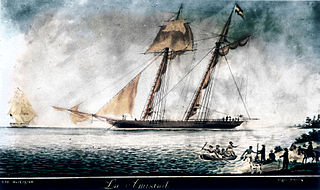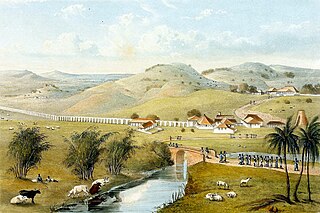Related Research Articles

The Bahamas, officially the Commonwealth of The Bahamas, is an island country within the Lucayan Archipelago of the West Indies in the North Atlantic. It takes up 97% of the Lucayan Archipelago's land area and is home to 88% of the archipelago's population. The archipelagic state consists of more than 3,000 islands, cays, and islets in the Atlantic Ocean, and is located north of Cuba and northwest of the island of Hispaniola and the Turks and Caicos Islands, southeast of the U.S. state of Florida, and east of the Florida Keys. The capital is Nassau on the island of New Providence. The Royal Bahamas Defence Force describes The Bahamas' territory as encompassing 470,000 km2 (180,000 sq mi) of ocean space.

Nassau is the capital and largest city of the Bahamas. With a population of 274,400 as of 2016, or just over 70% of the entire population of the Bahamas, Nassau is commonly defined as a primate city, dwarfing all other towns in the country. It is the centre of commerce, education, law, administration, and media of the country.

The earliest arrival of people in the islands now known as The Bahamas was in the first millennium AD. The first inhabitants of the islands were the Lucayans, an Arawakan-speaking Taino people, who arrived between about 500 and 800 AD from other islands of the Caribbean.

A slave rebellion is an armed uprising by enslaved people, as a way of fighting for their freedom. Rebellions of enslaved people have occurred in nearly all societies that practice slavery or have practiced slavery in the past. A desire for freedom and the dream of successful rebellion is often the greatest object of song, art, and culture amongst the enslaved population. Many of the events, however, are often violently opposed and suppressed by slaveholders.

Andros Island is an archipelago within the Bahamas, the largest of the Bahamian Islands. Politically considered a single island, Andros in total has an area greater than all the other 700 Bahamian islands combined. The land area of Andros consists of hundreds of small islets and cays connected by mangrove estuaries and tidal swamplands, together with three major islands: North Andros, Mangrove Cay, and South Andros. The three main islands are separated by bights, estuaries that trifurcate the island from east to west. It is 167 kilometres (104 mi) long by 64 km (40 mi) wide at the widest point.

The coastwise slave trade existed along the eastern coastal areas of the United States in the antebellum years prior to 1861. Shiploads and boatloads of slaves in the domestic trade were transported from place to place on the waterways. Hundreds of vessels of various sizes and capacities were used to transport the slaves, generally from markets of the Upper South, where there was a surplus of slaves, to the Deep South, where the development of new cotton plantations created high demand for labor.
The Creole case was a slave revolt aboard the American slave ship Creole in November 1841, when the brig was seized by the 128 slaves who were aboard the ship when it reached Nassau in the British colony of the Bahamas where slavery was abolished. The brig was transporting enslaved people as part of the coastwise slave trade in the American South. It has been described as the "most successful slave revolt in US history". Two died in the revolt, an enslaved person and a member of the crew.

La Amistad was a 19th-century two-masted schooner, owned by a Spaniard colonizing Cuba. It became renowned in July 1839 for a slave revolt by Mende captives, who had been captured and sold to European slave traders, and illegally transported by a Portuguese ship from West Africa to Cuba in violation of existing European treaties against the Atlantic slave trade. Two Spanish plantation owners, Don José Ruiz and Don Pedro Montes, bought 53 captives, including four children, in Havana, Cuba, and were transporting them on the ship to their plantations near Puerto Príncipe. The revolt began after the schooner's cook jokingly told the slaves that they were to be "killed, salted, and cooked." Sengbe Pieh, a Mende man, also known as Joseph Cinqué, unshackled himself and the others on the third day and started the revolt. They took control of the ship, killing the captain and the cook. In the melee, three Africans were also killed.

Nat Turner's Rebellion, historically known as the Southampton Insurrection, was a rebellion of enslaved Virginians that took place in Southampton County, Virginia, in August 1831. Led by Nat Turner, the rebels killed between 55 and 65 White people, making it the deadliest slave revolt in U.S. history. The rebellion was effectively suppressed within a few days, at Belmont Plantation on the morning of August 23, but Turner survived in hiding for more than two months afterward.

Tacky's War, Tacky's Revolt, or Tacky's Rebellion, was a widespread slave rebellion in the British Colony of Jamaica in the 1760s. Led by Akan people -- tribes including Ashanti, Fanti, Nzema and Akyem, -- it was loosely led by a Fanti royal and warlord called Tacky (Takyi) in eastern Jamaica, and Dahomean war chief or coastal headman Apongo in the western end of the island.

The Royal Bahamas Police Force is the national law enforcement agency of the Commonwealth of The Bahamas. It operates within the portfolio of the Ministry of National Security. The police force was established on 1 March 1840 and is headquartered on East Street Hill in Nassau, Bahamas.

The Heroic Slave, a Heartwarming Narrative of the Adventures of Madison Washington, in Pursuit of Liberty is a short piece of fiction, or novella, written by abolitionist Frederick Douglass, at the time a fugitive slave based in Boston. When the Rochester Ladies' Anti Slavery Society asked Douglass for a short story to go in their collection, Autographs for Freedom, Douglass responded with The Heroic Slave. The novella, published in 1852 by John P. Jewett and Company, was Douglass's first and only published work of fiction.
Afro-Bahamians are an ethnicity originating in The Bahamas of predominantly or partial African descent. They are descendants of various African ethnic groups, many associated with the Bight of Biafra, Ghana, Songhai and Mali, the various Fula kingdoms, the Oyo Empire, and the Kingdom of Kongo. According to the 2010 Census, 92.7% of The Bahamas' population identifies as Black African descent.
White Bahamians are Bahamian citizens of European ancestry, most of whom trace their ancestry back to England, Scotland and Ireland. Bahamians of European descent are sometimes called "Conchs", a term that is also applied to people of White Bahamian descent in Florida. White Bahamians were a majority in the 18th century, but now constitute less than 5% of the Bahamian population. White Bahamians are largely concentrated in Eleuthera, the Abaco Islands, Long Island, and New Providence.
The Enterprise was a United States merchant vessel active in the coastwise slave trade in the early 19th century along the Atlantic Coast. Bad weather forced it into Hamilton, Bermuda waters on February 11, 1835 while it carried 78 slaves in addition to other cargo. It became the centre of a minor international incident when the British authorities freed nearly all the slaves. Britain had abolished slavery in its Caribbean colonies effective 1834. At that time it advised "foreign nations that any slavers found in Bermuda [and the Bahamas] waters would be subject to arrest and seizure. Their cargoes were liable to forfeiture" without compensation.
Hermosa was an American slave ship whose 1840 grounding in the Bahamas led to a controversy between the United Kingdom and the United States over the 38 slaves who had been on board the ship and were freed by the British authorities.
Angola was a prosperous community of up to 750 maroons that existed in Florida from 1812 until Florida became a U.S. territory in 1821, at which point it was destroyed. The location was along the Manatee River in Bradenton, Florida, near Manatee Mineral Springs Park. The exact location is expansive, ranging from where the Braden River meets the Manatee River down to Sarasota Bay; archaeological research focuses on the Manatee Mineral Spring—a source of fresh water and later the location of the Village of Manatee two decades after the destruction of the maroon community. Archaeological evidence has been found and the archaeology report by Uzi Baram is on file with the Florida Division of Historical Resources of the Florida Department of State.

Slavery in the Bahamas dates back several centuries.
Bahamian nationality law is regulated by the 1973 Constitution of the Commonwealth of The Bahamas, as amended; The Bahamas Nationality Act; The Bahamas Immigration Act; and various British Nationality laws. These laws determine who is, or is eligible to be, a national of The Bahamas. Bahamian nationality is typically obtained either on the principle of jus soli, i.e. by birth in The Bahamas; or under the rules of jus sanguinis, i.e. by birth abroad to a father with Bahamian nationality. It can also be granted to persons with an affiliation to the country, or to a permanent resident who has lived in the country for a given period of time through naturalisation. There is currently no program in The Bahamas for citizenship by investment. Nationality establishes one's international identity as a member of a sovereign nation. Though it is not synonymous with citizenship, rights granted under domestic law for domestic purposes, the United Kingdom, and thus the commonwealth, has traditionally used the words interchangeably.
References
- ↑ "INSIGHT: A challenge to a new generation of Bahamians". 30 January 2017. Retrieved 31 October 2017.
- ↑ Tinker, Keith L. (2013). The African Diaspora to the Bahamas. FriesenPress. p. 64. ISBN 9781460205549.